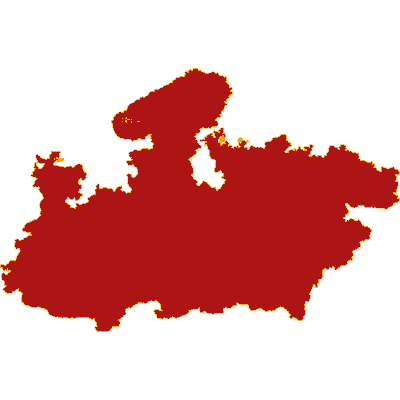
Madhya Pradesh, located in central India, is the country’s second-largest state. It is well known for its diverse biodiversity, agricultural heritage, and cultural heritage. However, the state faces a number of challenges, including poverty, a lack of resources, and the effects of climate change. It is also the location of tribes. 40% of India’s tribal population lives here and practises natural farming. The state has an agrarian economy, with the primary sector accounting for 35% of GVA. The state is endowed with 11 agro-ecological zones that provide an ecological support system for the production of unique crops and varieties.
Dindori
Dindori district is a rich area with abundant natural resources and forests. The majority of the district’s population is tribal, with a reliance on forest and agricultural-based livelihood resources. However, due to low agricultural production and poor market connectivity, Dindori remains one of India’s backward districts. The main reason for the district’s backwardness is a lack of infrastructure. Women’s literacy rates are also very low when compared to national and state averages, which has an impact on child education because parents are unaware. As a result of the aforementioned reasons, no large industries can be established in the district due to a lack of infrastructure and power supply. The District’s Socioeconomic Aspects Dindori is primarily a rural and tribal district. Irrigation facilities are insufficient. Overall, the district’s economy is very poor, with a very low per capita income.
Mandla
Mandla is a tribal district in Madhya Pradesh’s east-central region. The district is almost entirely within the catchment area of the Narmada River and its tributaries. The district is dominated by a tribal population. Tribals are divided into four subcastes: Baiga, Gond, Kol, and Pradhan. The majority of them rely on the forest for a living. The main reasons for the district’s poor literacy, status, and educational backwardness are social underdevelopment, a weak economy, conservative attitudes, blind faiths, unsanitary smoking habits, alcoholism, a careless attitude towards health, and a lack of education, particularly for girls.
Dewas
Dewas District, in Ujjain Revenue Division, is situated on the Malwa plateau in the West-central part of Madhya Pradesh. The district is bounded by Ujjain district in the north, Indore district in the west, West Nimar district in the south-west, East Nimar district in the south, Hoshangabad district in the south-east, Sehore district in the east, and Shajapur district in the North-East. The tropic of cancer passes through the district near Nemawar village, south of Khategaon town. The economy of the district is dependent on both the agricultural and industrial sectors equally. The chief agricultural products in the district are wheat, sorghum, rice, cotton, etc. The adoption of new agricultural technologies amongst the farmers of the district helps to increase the production of various agricultural items. In the past few years, the development of its industrial sector has also been remarkable. The growth in its industry sector provides employment facilities for its locals. It has some specific small-scale industries of traditional crafts such as shoes, synthetic Indian carpets, various leather works, etc.
Udyogini, an organization focused on promoting sustainable livelihoods and entrepreneurship, has implemented various initiatives in Madhya Pradesh to address these challenges.
Value Chain Intervention:
A value chain intervention was implemented by the organisation with the goal of empowering marginalised communities and increasing the income of small and marginal farmers, women, and youth. Through this intervention in Mandla district, we promote end-to-end support for the poultry and goat value chains among 1400 farmers, assisting them from production to end-market support. In the Dindori district, we are promoting oil seed production with 500 farmers, as well as value addition and market support. In Dewas, we promote the potato value chain and strive to reduce 15% food waste while also ensuring better price realisation for farmers, end-to-end market linkage, and increasing beneficiaries' income by 15 to 20% through livelihood and capacity building programmes that provide them with access to markets and opportunities for entrepreneurship.
Skill Development:
We focus on villagers' skill development, particularly in the areas of livelihoods and entrepreneurship. To improve their knowledge and skills in livelihood development and entrepreneurship, we have conducted training programmes for frontline workers, benefiting 10,000 villagers.
Entrepreneurship:
We encourage entrepreneurship by providing complete support to 500 businesses in Madhya Pradesh. This assistance includes business setup and support, product research and development, credit and market linkages, and promotion and support for farmer-producer organisations (FPOs).
Our initiatives in Madhya Pradesh have had a significant impact on livelihood development and entrepreneurship in the region. The impact of our work can be seen through various indicators:
- Improved livelihoods: Through our interventions, we have contributed to increased income and access to information, leading to improved livelihoods for the community. For example, 5,000 villagers have earned an additional income of 10% through product development and marketing, while 8,000 villagers have adopted better livelihood practises taught by Udyogini.
- Women's empowerment: We have supported 2,200 women in livelihood enhancement, enabling them to enhance their income-generating activities and improve their economic independence.
- Skill development: Our training programmes have reached 10,000 villagers, equipping them with essential skills in livelihood development and entrepreneurship.
- Market-based livelihood approach: We have successfully created awareness and understanding among 15,000 villagers about the market-based livelihood approach, fostering a shift towards sustainable and market-oriented practises.
- Enterprise promotion: Through our efforts, 500 enterprises have received comprehensive support, including product research and development, credit linkages, market linkages, and assistance in setting up their businesses.
- Entrepreneurship ecosystem: We have organised three annual entrepreneurship summits, facilitating networking and collaboration between aspiring entrepreneurs and potential capital providers.


